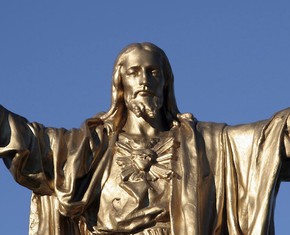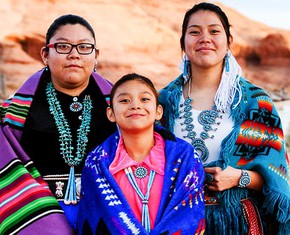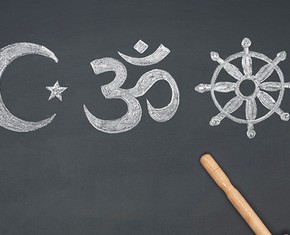The views expressed in our content reflect individual perspectives and do not represent the authoritative views of the Baha'i Faith.
I suspected that our world required something extraordinary to fix it, something unprecedented, something new and as yet undiscovered, something beautiful to mitigate its murderous ways.
So, disturbed by the war in Vietnam, perplexed by the scourge of racism in America, and dismayed by the lack of kindness in American politics, my girlfriend and I, as illogical as it may sound, rode our bikes to Portland, Maine, and, like the hippies of those times, searched for a solution, for a way to reverse the world, as environmentalist Laura Sewall would say, and there for the first time bowed to spiritual authority, became Baha’is and got married, in 1971. Our equilibrium upset, we were revolutionized:
The world’s equilibrium hath been upset through the vibrating influence of this most great, this new World Order. Mankind’s ordered life hath been revolutionized through the agency of this unique, this wondrous System—the like of which mortal eyes have never witnessed. – Baha’u’llah, Gleanings from the Writings of Baha’u’llah, p. 36.
For Sewall the encounter with beauty motivates our desire to change ourselves and our world, and I agree. I felt it in myself.
To experience the beauty in Maine of a right whale surfacing off Small Point, for example, a great cormorant flying the Kennebec, or the song of the thrush in the pitch pines, if the thing be beautiful, breaks into our consciousness imposing its will upon ours. Thus our relationship to the beauty of the natural world, she says, becomes an authoritative self-organizing principle. By focusing on beauty we become beautiful: “We make no mistake about the path we are on. We’re walking the path of beauty and there’s no turning back.” – Laura Sewall, Sight and Sensibility, pp. 117-19.
Were we to stretch our minds to include the beauty of human beings, those who might at first appear strange to us, those whose skin color, nationality, religion, or economic status exist outside of what is familiar to us, they too would come to dwell more beautifully and more meaningfully within our consciousness.
In this way, any and all “others,” those so-called strangers to our habitual lives—whether they be creatures of the natural world, dwellers in city apartments on the other side of the planet, or nomads roaming the desert—become inhabitants in our hearts and beloved objects of our gaze. Thus we “become the world within which we are,” is Sewall’s way of saying this. – Ibid., p. 263.
Just so, in becoming a Baha’i, I took in the beauty of this Faith and made room for it in my consciousness. Indeed, Baha’is refer to Baha’u’llah, the divine messenger who enunciated its principles, as “the Blessed Beauty,” the ideal and ultimate object of our worshipful love. Thus to have invited Baha’u’llah into my heart was to invite in the beauty, love, kindness, justice, as well as the spiritual authority which his teachings embody, there to establish the energy field of my identity. As he suggested:
Turn thy sight unto thyself, that thou mayest find Me standing within thee, mighty, powerful and self-subsisting. – Baha’u’llah, The Hidden Words, p. 7.
In this way, as William James described pure religious conversion:
… the hot places in a man’s consciousness, the group of ideas to which he devotes himself, and from which he works, call it the habitual centre of his personal energy … now take a central place, and that religious aims form the habitual centre of his energy. – The Varieties of Religious Experience, p. 162.
Those hot places, which Baha’u’llah described as the “names” and “attributes” of God, comprise what theologians and philosophers, seekers and saints have always understood as virtue: mercy, kindliness, compassion, love, patience, forbearance, etc. So in becoming a Baha’i, I exchanged the disorganized and fungible elements of my youthful psyche for those more ordered, more beautiful, more virtuous—and hotter.
I remember walking the streets of Portland, that cold January, having just become a Baha’i, being enveloped by a feeling of intense love for each anonymous person I passed on the street, each face a map of the heart, each snowflake a prism, each street sparrow an eagle during a month-long period of euphoria and expanded consciousness. I felt the same ecstasy that Sewall describes in her brilliant encounters with beauty as “signals streaming through the pores of my antlers.” – Laura Sewall, Sight and Sensibility, p. 63.
Soon I would dream that a revered, deceased central figure of the Baha’i Faith was teaching me to fly. I tasted the joy and excitement of an awakened soul, for certain.
Since then I have learned that to live a Baha’i life means trading what is habitual for what is holy, what is cold for what is hot, and that in doing so lies the reformation of ourselves and of our world, that embedded in every conversation, every moment of time, in the voice of rushing water, and behind all appearances, sparkles from the beauty realm await, and some entry to fire and light, and an invitation to become hotter and more illuminated and more beautiful, if we dare.
But the reason I am telling you all of this is to remind you that in addition to the blessings that the love of God might mercifully bestow, it is the full force of individual effort in conformity with the laws and ordinances of the Blessed Beauty, by which we might become, and our world, more beautiful. Indeed, Baha’i philosopher William Hatcher cautioned that the benefits of spirituality:
… are not haphazard experiences which we can casually cajole from the universe. They must be consciously sought and practiced as diligently as any scientific or academic discipline. Scientific method, the conscious, systematic, organized, and directed use of our mental faculties, must be employed if we are to be successful in developing spirituality. – William Hatcher, “The Science of Religion,” Canadian Association for Studies on the Baha’i Faith, Volume 2, 1977, p. 43.
I do not say these things in a moralistic tone, but as a cry from the heart, in the very midst of our daily lives. I want you to know that I have never looked back since that midnight hour in the home of a Baha’i, those many years ago, when my girlfriend and I became Baha’is and got married. I want you to know so that your day-by-day, minute-by-minute quest for beauty, Baha’i or not, may never languish.
















Comments
Sign in or create an account
Continue with Googleor